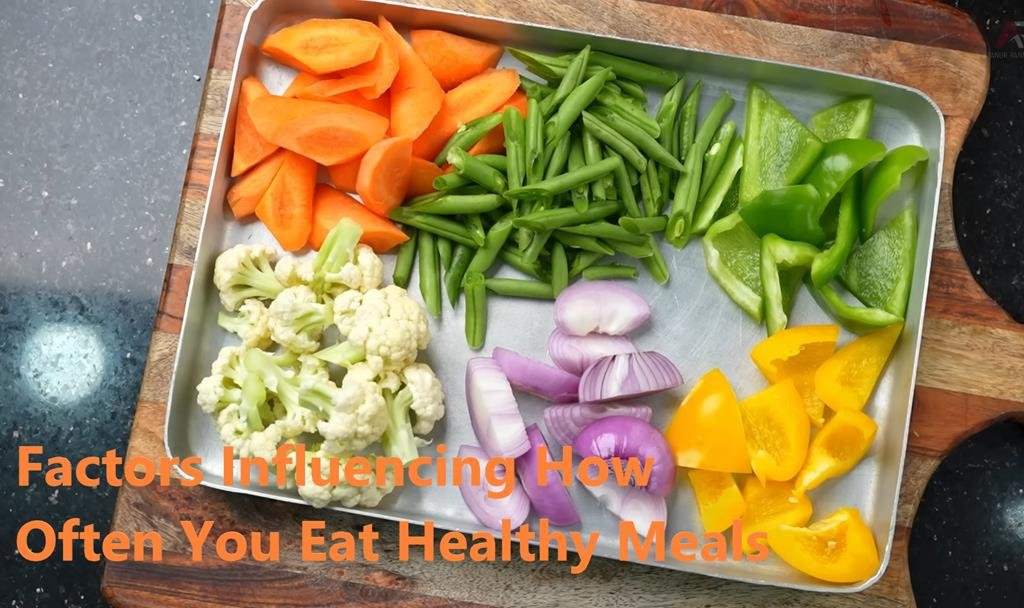“Discover how often you should eat healthy meals with our comprehensive guide. Explore tips, benefits, and strategies to incorporate balanced nutrition into your daily routine for a healthier lifestyle.”
Balancing the hustle and bustle of daily life with nutritious eating can feel like walking a tightrope. How often do you eat healthy meals might seem like a simple question, but it opens the door to exploring your eating habits, understanding nutritional needs, and finding ways to enhance your overall well-being.
Whether you’re striving to eat healthier every day or looking for ways to incorporate more nutritious options into your routine, this guide is here to help you navigate the delicious journey toward better eating habits.
Why Eating Healthy Matters
Before diving into the frequency of healthy meals, let’s take a moment to appreciate why healthy eating is so crucial. It’s not just about maintaining a certain weight or looking good in your favorite jeans. Eating healthy plays a pivotal role in:
- Boosting Energy Levels: Nutrient-rich foods provide the fuel your body needs to stay energized throughout the day.
- Improving Mental Health: A balanced diet can enhance mood and reduce the risk of mental health issues like depression and anxiety.
- Preventing Chronic Diseases: Consistent healthy eating helps lower the risk of conditions such as heart disease, diabetes, and certain cancers.
- Enhancing Longevity: Good nutrition contributes to a longer, healthier life, allowing you to enjoy more moments with loved ones.
How Often Do You Eat Healthy Meals? Understanding the Basics
Defining a Healthy Meal
First things first—what exactly constitutes a healthy meal? A balanced meal typically includes:
- Lean Proteins: Chicken, fish, tofu, legumes.
- Whole Grains: Brown rice, quinoa, whole wheat bread.
- Fruits and Vegetables: A colorful variety to ensure a range of vitamins and minerals.
- Healthy Fats: Avocado, nuts, olive oil.
- Hydration: Plenty of water to keep you hydrated and support bodily functions.
Recommended Frequency
Nutritionists generally recommend aiming for at least five servings of fruits and vegetables each day, alongside balanced portions of proteins, grains, and fats. But how often do you eat healthy meals can vary based on individual lifestyles, dietary needs, and personal goals. Here’s a closer look:
Factors Influencing How Often You Eat Healthy Meals

Lifestyle and Schedule
A busy schedule can make it challenging to prepare healthy meals consistently. Long work hours, family commitments, and social activities can sometimes lead to reliance on quick, less nutritious options.
Access to Healthy Foods
Living in an area with limited access to fresh produce or healthy food options can hinder your ability to eat healthily. Food deserts, where nutritious food is scarce, pose significant challenges.
Knowledge and Education
Understanding what constitutes a healthy meal and how to prepare it is essential. Without proper knowledge, it’s easy to make uninformed food choices that may not support your health goals.
Budget Constraints
Healthy foods can sometimes be more expensive than processed or fast foods. Budget limitations can impact how often you can afford to eat nutritious meals.
Personal Preferences and Habits
Taste preferences and ingrained eating habits play a significant role in determining how often you opt for healthy meals. Breaking unhealthy habits requires conscious effort and gradual changes.
Benefits of Eating Healthy Meals Regularly
Enhanced Physical Health
Regular consumption of nutritious meals strengthens your immune system, improves digestion, and supports overall physical health.
Mental Clarity and Focus
Healthy eating boosts cognitive function, enhancing your ability to concentrate, think clearly, and make better decisions.
Weight Management
A balanced diet helps in maintaining a healthy weight by regulating appetite and metabolism, reducing the risk of obesity.
Better Sleep Quality
Nutrient-rich foods contribute to better sleep patterns, helping you wake up refreshed and energized.
Improved Mood and Emotional Well-Being
Certain foods, like those rich in omega-3 fatty acids and antioxidants, can positively impact your mood and reduce stress levels.
Common Challenges in Maintaining a Healthy Diet
Time Constraints
Finding the time to prepare healthy meals can be tough, especially with a hectic schedule. Meal prepping and planning can help mitigate this issue.
Temptation of Unhealthy Foods
Fast food, sugary snacks, and processed foods are often more convenient and crave-inducing, making it hard to resist.
Lack of Motivation
Staying motivated to eat healthy consistently can be challenging, especially when immediate results aren’t visible.
Social Pressures
Eating out with friends or family can sometimes lead to choices that aren’t aligned with your healthy eating goals.
Limited Cooking Skills
Not knowing how to prepare healthy meals can be a significant barrier. Investing time in learning basic cooking skills can make a big difference.
Tips to Increase the Frequency of Healthy Meals
Plan Your Meals
Take time each week to plan your meals. This helps ensure you have the necessary ingredients on hand and reduces the likelihood of resorting to unhealthy options.
Meal Prep in Advance
Prepare meals or meal components in advance. Cooking in bulk and storing portions in the fridge or freezer can save time and make healthy eating more convenient.
Incorporate a Variety of Foods
Eating a wide range of foods ensures you get a spectrum of nutrients and keeps meals interesting, reducing the temptation to eat the same thing repeatedly.
Listen to Your Body
Pay attention to hunger and fullness cues. Eating when you’re genuinely hungry and stopping when you’re satisfied can prevent overeating and promote a balanced diet.
Make Healthy Choices Accessible
Keep healthy snacks and ingredients within easy reach. Having fruits, nuts, and whole grains readily available makes it easier to choose nutritious options.
Seek Support
Engage with friends, family, or online communities that encourage healthy eating. Support systems can provide motivation and accountability.
Educate Yourself
Learn about nutrition and healthy cooking. Understanding the benefits of various foods can inspire you to make better choices.
Sample Meal Plan: How Often Do You Eat Healthy Meals?
Creating a sample meal plan can help visualize how to incorporate healthy meals into your daily routine. Here’s an example of a balanced week:
| Day | Breakfast | Lunch | Dinner | Snacks |
|---|---|---|---|---|
| Monday | Greek yogurt with honey and berries | Quinoa salad with chickpeas and veggies | Grilled salmon with steamed broccoli | Apple slices with almond butter |
| Tuesday | Oatmeal topped with nuts and banana | Turkey and avocado wrap with mixed greens | Stir-fried tofu with brown rice | Carrot sticks and hummus |
| Wednesday | Smoothie with spinach, mango, and protein powder | Lentil soup with whole-grain bread | Chicken fajitas with bell peppers | Greek yogurt with granola |
| Thursday | Scrambled eggs with spinach and tomatoes | Grilled vegetable panini | Baked cod with quinoa and asparagus | Mixed nuts and dried fruit |
| Friday | Whole-grain toast with avocado and poached egg | Sushi rolls with a side salad | Beef and vegetable stir-fry | Fresh fruit salad |
| Saturday | Pancakes made with whole wheat flour and berries | Caprese salad with balsamic glaze | Vegetable curry with brown rice | Dark chocolate and strawberries |
| Sunday | Smoothie bowl with assorted toppings | Grilled chicken Caesar salad | Pasta primavera with whole-grain pasta | Celery sticks with peanut butter |
Personal Tip: I love starting my day with a colorful smoothie bowl—it’s not only visually appealing but also packs a nutritional punch that keeps me energized!
How Often Do You Eat Healthy Meals? Assessing Your Habits
Self-Evaluation
Take a moment to reflect on your current eating habits. Ask yourself:
- How many healthy meals do I consume each day?
- Do I feel energized or sluggish after eating?
- Am I meeting my nutritional needs consistently?
Setting Realistic Goals
Start by setting achievable goals. If you currently eat one healthy meal a day, aim to increase it to two over the next week. Gradually build up to more frequent healthy meals as you become more comfortable with the changes.
Tracking Your Progress
Keep a food diary or use a meal-tracking app to monitor your intake. Tracking helps identify patterns, celebrate successes, and pinpoint areas for improvement.
Overcoming Obstacles to Healthy Eating
Busy Schedules
Integrate quick and easy healthy recipes into your routine. Smoothies, salads, and stir-fries can be prepared in under 30 minutes.
Cravings for Unhealthy Foods
Identify triggers that lead to unhealthy eating and find healthier alternatives. Craving something sweet? Try a piece of dark chocolate or a fruit smoothie instead of candy.
Lack of Motivation
Remind yourself of the benefits of healthy eating. Whether it’s better health, improved mood, or increased energy, keeping your goals in mind can help maintain motivation.
Social Situations
Plan ahead when dining out. Look at menus in advance and choose healthier options. Don’t be afraid to ask for modifications to suit your dietary needs.
Frequently Asked Questions (FAQs)
1. How often do you eat healthy meals affect your overall health?
Eating healthy meals consistently significantly impacts your physical and mental well-being. Regular consumption of balanced meals boosts energy levels, improves mood, and reduces the risk of chronic diseases.
2. Can I eat healthy every day?
Absolutely! While it might seem challenging at first, with proper planning and preparation, incorporating healthy meals into your daily routine is entirely achievable.
3. What defines a healthy meal?
A healthy meal typically includes a balance of lean proteins, whole grains, fruits and vegetables, and healthy fats. It should provide essential nutrients without excessive calories, sugars, or unhealthy fats.
4. How can I make healthy eating easier with a busy lifestyle?
Meal planning, prepping in advance, choosing quick and nutritious recipes, and keeping healthy snacks on hand can make healthy eating more manageable even with a hectic schedule.
5. Are healthy meals more expensive?
While some healthy foods can be pricier, there are many budget-friendly options. Buying in bulk, choosing seasonal produce, and cooking at home can help keep costs down.
6. What are some quick healthy meal ideas?
Quick healthy meal ideas include smoothies, salads with a variety of vegetables and proteins, whole-grain wraps, stir-fries with lean meats and veggies, and overnight oats.
7. How often should I include vegetables in my meals?
Aim to include vegetables in every meal. They are rich in vitamins, minerals, fiber, and antioxidants that are essential for maintaining good health.
8. Is it okay to have occasional unhealthy meals?
Yes, balance is key. Allowing yourself occasional indulgences can prevent feelings of deprivation and help maintain a sustainable healthy eating pattern.
9. How do I stay motivated to eat healthy?
Set clear, achievable goals, track your progress, seek support from friends or communities, and remind yourself of the benefits you’re gaining from healthy eating.
10. Can healthy eating improve my mental health?
Yes, a balanced diet can enhance brain function, stabilize mood, and reduce symptoms of depression and anxiety by providing essential nutrients that support mental health.
Conclusion
So, how often do you eat healthy meals? The frequency of healthy eating plays a crucial role in shaping your overall health and well-being. By understanding the importance of balanced meals, recognizing the factors that influence your eating habits, and implementing practical tips to overcome common challenges, you can make significant strides toward a healthier lifestyle. Remember, it’s not about perfection but rather making consistent, informed choices that align with your personal health goals. Embrace the journey of discovering nutritious, delicious meals that nourish your body and soul, and enjoy the myriad benefits that come with a healthier diet.


